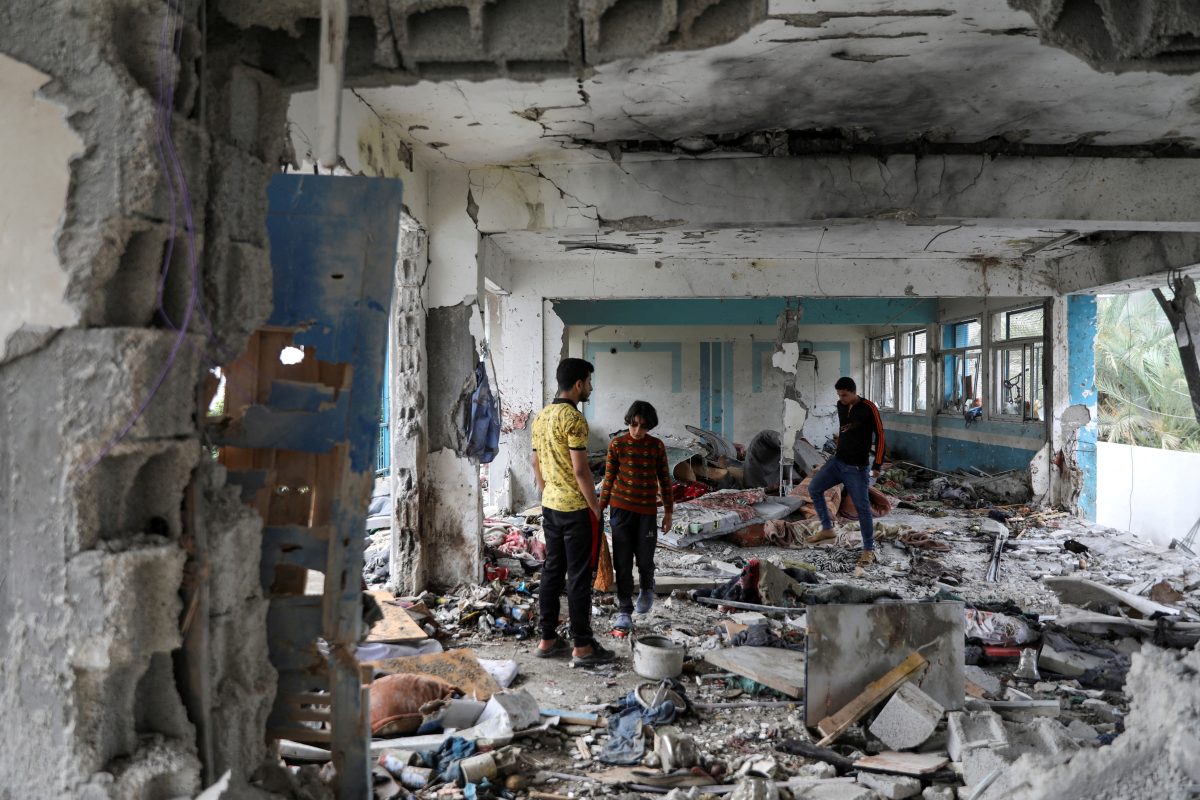GENEVA/JERUSALEM/CAIRO, (Reuters) – A U.N. inquiry found today that both Israel and Hamas had committed war crimes early in the Gaza war, and that Israel’s actions also constituted crimes against humanity because of the immense civilian losses.
The findings were from two parallel reports by the U.N. Commission of Inquiry (COI), one focusing on the Oct. 7 attacks and another on Israel’s response.
Israel, which did not cooperate with the commission, dismissed the findings as the result of anti-Israeli bias. Hamas did not immediately respond to a request for comment.
The war began on Oct. 7 when militants led by Hamas, the Islamist group ruling Gaza, killed 1,200 Israelis and took more than 250 hostage, according to Israeli tallies.
Israel’s military retaliation has caused the deaths of more than 37,000 Palestinians, according to Gaza’s health ministry, displaced most of Gaza’s population of 2.3 million, caused widespread hunger, and devastated housing and infrastructure.
Negotiators from the U.S., Egypt and Qatar have tried for months to mediate a ceasefire and free the hostages, more than 100 of whom are believed to remain captive in Gaza.
Izzat al-Rishq, a member of Hamas’ political bureau, said its formal response to a U.S. ceasefire proposal outlined by U.S. President Joe Biden on May 31 was “responsible, serious and positive” and “opens up a wide pathway” for an accord.
But an Israeli official said on Tuesday, on condition of anonymity, that Israel had received the answer via the mediators and that Hamas “changed all of the main and most meaningful parameters” and “rejected the proposal for a hostage release”.
Major powers are intensifying efforts to halt the conflict in part to prevent it from spiralling into a wider regional war, with a dangerous flashpoint being the sharply escalating hostilities on the Lebanese-Israeli border.
Lebanon’s Hezbollah militia, backed by Iran, fired barrages of rockets at Israel on Wednesday in retaliation for an Israeli strike that killed a senior Hezbollah field commander. Israel said it had in turn attacked the launch sites from the air.
Taleb Abdallah, also known as Abu Taleb, was the most senior Hezbollah commander killed during eight months of hostilities, a security source said, and Hezbollah official Hashem Safieddine vowed that group would expand its operations against Israel.
ISRAEL CONTINUES ASSAULTS IN GAZA
The proposal outlined by Biden envisages a ceasefire and phased release of Israeli hostages in Gaza in exchange for Palestinians jailed in Israel, ultimately leading to a permanent end to the war.
A non-Israeli official briefed on the matter, who also declined to be identified, said Hamas had proposed a new timeline for a permanent ceasefire and withdrawal of Israeli troops from Gaza.
Hamas also wants written guarantees from the U.S. on the ceasefire plan, two Egyptian security sources said.
The U.S. has said Israel has accepted its proposal, but Israel has not publicly stated this.
As Israel has continued assaults in central and southern Gaza that are among the bloodiest of the war, Prime Minister Benjamin Netanyahu has repeatedly said Israel will not commit to end its campaign in Gaza before Hamas is eliminated.
Residents said Israeli forces had pounded areas across Gaza on Wednesday as tanks advanced towards the northern part of the city of Rafah, on the Egyptian border.
Palestinian health officials said six people had been killed in an Israeli air strike on Gaza City in the north, and that one man had been killed when a tank shell hit a house in Rafah.
Footage circulated on social media from Rafah’s “Saudi” neighbourhood, which Reuters had not verified, showed swathes of devastation after tanks retreated.
The Hamas-run Gaza government media office said Israeli forces were also advancing into the area around Rafah from the east, and heading towards the sea.
The Israeli military said that in the previous 24 hours it had eliminated a number of militant cells in “close-quarters encounters” in the Rafah area and destroyed structures rigged with explosives.
It said planes had also struck an armed Hamas cell and a weapons store in central Gaza.
In the central city of Deir Al-Balah, mother of two Huda said the displaced had lost hope that the war would end anytime soon.
“We lost faith both in our leaders, and in the world,” she told Reuters via a chat app.
“Ceasefire promises by our leaders and the world are like words written in butter at night, they disappear with the first light of day.”
UN FINDINGS ON WAR CRIMES
The U.N. reports released in Geneva, which cover the conflict through to December, found both sides had committed war crimes including torture; murder or wilful killing; outrages upon personal dignity; and inhuman or cruel treatment.
The investigators also found Israel committed additional war crimes including starvation as a method of warfare, not only failing to provide essential supplies such as food, water, shelter and medicine to Gazans but also acting “to prevent the supply of those necessities by anyone else”.
Some of the crimes, such as murder, also constitute crimes against humanity by Israel, the commission said in a statement, adding:
“The immense numbers of civilian casualties in Gaza and widespread destruction of civilian objects and infrastructure were the inevitable result of a strategy undertaken with intent to cause maximum damage, disregarding the principles of distinction, proportionality and adequate precautions.”
The evidence gathered by such U.N.-mandated bodies can form the basis for war crimes prosecutions.










